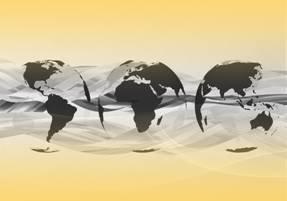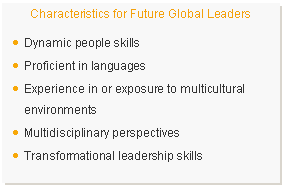The Global Leadership Challenge
By Wayne Oppel
Full Article - PDF
The pace of business has changed. Organizations today demand effective, adaptable and committed leadership. This reality presents a challenge to companies who must develop leaders despite the constraints of limited time and financial resources. As a result, organizations are looking to more novel, less traditional ways to identify and train global leaders who are dynamic and thrive in complex environments because they possess a repertoire of qualities and skills to be effective.
Noted scholar, Noel Tichy, argues that, “Traditional managerial skills, such as financial acumen, manufacturing expertise and marketing prowess are important ingredients in most organization success stories, but not sufficient for organizational transformation and sustainability. The focus on the most critical element – leadership – is needed as organizations are challenged by an increasingly competitive environment.”
The Making of a Global Leader
So, what makes a global leader? I set out to answer this question by interviewing four executives at different organizations. Each unique perspective shared by these leaders revealed significant characteristics about global leaders and the challenges facing their development.
Among the most significant of these qualities was a strong view that leaders must strive to create a more generous society where global organizations have a social responsibility to host nations and international partners. One executive, Rick Snider, directs international resources development for a non-profit organization. He explains, “Our organization has come to recognize the decline of nation states and boundaries and the need to create a more generous society worldwide. We have a moral obligation and a social responsibility to the world at large.” He adds that this obligation is a part of his organization’s culture, “We, as global leaders, want to make an important contribution and impact both locally and globally. The desire to help people of the world models and reinforces our leadership values.”
Beyond social responsibility, global leaders must also be comfortable and effective in dealing with uncertainty. Neal Holladay, oversees training and client relations for an international management training firm focused in South American markets. Holladay believes that by assisting organizations with developing their human assets, they are creating a positive competitive environment through sustained behavioral changes in the workforce.
 But, he also admits that the pace and interconnectedness of international events, along with the speed and impact of technology, is challenging. “It requires our organization to develop a business savvy that embraces uncertainty, while managing and leading with integrity in this complex global society,” said Holladay. But, he also admits that the pace and interconnectedness of international events, along with the speed and impact of technology, is challenging. “It requires our organization to develop a business savvy that embraces uncertainty, while managing and leading with integrity in this complex global society,” said Holladay.
If global leaders are required to manage through uncertainty, then they must also be flexible and responsive to change. Carla Della Valentina, CEO of Valen Group International, leads a multinational company that manufactures wood drawer component parts in Italy, the United States and Romania. She sees her company as a learning organization and credits this perspective to their success. “The key to our global leadership has been our ability to become more adaptable and flexible in creating, accepting and adapting to change,” said Della Valentina. “By seeking opportunities for challenges and learning, we have developed a strategic vision that incorporates both a commitment to the success of the organizational goals and success of our employees.”
This view is shared by Kerry Kerr, a senior product manager at another multinational company that manufactures and supplies furniture parts to Europe, Asia and South America. Kerr adds that he is supported by corporate leadership in his ideas of continuous improvement, learning and development. “This creates an atmosphere of a global workforce moving in the same direction for the common good of all of the employees,” said Kerr.
In all, these four executives each expressed common factors that influenced their effectiveness and development as global leaders. For them, the essential qualities and attributes include:
- Coping with the speed of inter-related international events and crises, including the speed of technology;
- Managing and leading with integrity in a growing complex global society;
- Managing the instability and gap between world poverty and the upper-income population;
- Becoming more adaptable and flexible in creating, accepting and adapting to change;
- Working previously in international environments or locations;
- Maintaining a vision that incorporates people from different cultures; and
- Recognizing the decline of nation states/boundaries.
But, beyond these traits, global leaders also share a common motivation. They see the importance of making a universal contribution and impact. They have a desire to help people through international public service and genuinely believe that the openness and expanse of international work are more challenging, engaging and energizing than leading within one’s own country.
Developing Global Leaders for the Future
The outlook for global leaders is optimistic. With a fast start into the 21st century, the practice of global business is more prevalent than ever. Furthermore, with the pace of development and change, there must be important considerations about the future of global leaders and their development.
Global business in the future will require leaders to be like explorers, guiding their organizations through unfamiliar and turbulent environments. With markets, suppliers, competitors, technology and customers around the world constantly shifting, traditional leadership models no longer work.
In their book titled, Global Explorers, Hal B. Gregerson, Allen J. Morrison and J. Stewart Black recognize “every global leader requires a certain set of unique skills and abilities that arise from country affiliation, industry, company, and functional dynamics and from these a core set of global characteristics will arise.”
Given the challenges and opportunities that emerge from global business, leaders of the future will need dynamic people skills, perhaps even more than academic and technical competencies. In addition, they will need to be proficient in languages and have exposure to multiple cultures and experiences in other countries. They must also have multidisciplinary perspectives, which are essential for problem solving in complex and changing environments.
 Moreover, they must transcend the old ways of transactional relationships and seek more enduring, sustainable and transformational relationships. In other words, leaders must empower their employees and seek to facilitate the employee’s development interests. This ideal of transformational leadership is essential if the organization is to evolve, adapt and change to pursue a wealth of opportunities. Moreover, they must transcend the old ways of transactional relationships and seek more enduring, sustainable and transformational relationships. In other words, leaders must empower their employees and seek to facilitate the employee’s development interests. This ideal of transformational leadership is essential if the organization is to evolve, adapt and change to pursue a wealth of opportunities.
When interviewing these four leaders, I found that each had a fundamental sense of passion— a passion for their job, organization and followers. I could see it in their eyes and hear it in their voice, the unmistakable glow of a transformational leader.
Just as Jesus demonstrated transformational leadership by training and empowering the disciples to go out into the world to continue His mission, these four executives have come to understand the need to be transformational leaders.
Jesus revolutionized our understanding of leadership. First, in a most controversial and striking picture of servanthood, by humbling Himself through obedience and performing a task so seemingly contradictory to His genuine deity (see John 13:4-5, 14-15). Secondly, He equipped his followers and empowered them to continue building from His foundational work (see John 21, Acts 1).
These executives understand that they must equip, and then release those whom they lead. They are savvy to provide followers the guidance and resources necessary to shape their experience, then let go and allow that collective wisdom to help them navigate through uncertainty and complexity.
Are you ready to take on this passion? Are you ready to lead your organization globally? Can you envision an organization that embraces building relationships with people from different backgrounds, that thrives in complexity and acts with high ethical standards knowing when and where to initiate change? I leave you with the most important question concerning global leadership in business today: Are you ready as an individual and an organization to embrace a sense of exploration and a desire to experience innovation in ways you may have previously never imagined? Be inquisitive and embrace every opportunity to learn. There is an entire world waiting.
Notes: 1. Concepts about transformational leadership and/or global context are found in: Tichy, N. M., & DeVanna, M. A. (1990). The Transformational Leader. The Key to Global Competitiveness. New York: John Wiley & Sons, Inc.; Burns, J.M. (1978).Leadership. New York: HarperCollins; and Marquardt, M., & Berger, N. (2000). Global Leaders for the 21st Century. Albany: SUNY Press. 2. For more about leaders as global explorers see: Black, J. S., Morrison, A. J., & Gregersen, H. B. (1999). Global Explorers. The Next Generation of Leaders. New York: Routledge.
About the Author
Dr. Wayne A Oppel owns the consulting firm, OPPEL Consulting Group in Winston-Salem, NC and serves as an adjunct faculty member at Guilford Technical Community College. He is a graduate of Regent University’s School of Business & Leadership where he received his Doctor of Strategic Leadership degree. His e-mail address is: drwaoppel@yahoo.com |